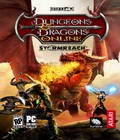Genre : MMO
Publisher: Atari
Developer: Turbine
Release Date: November 02, 2005
Continuing our tour of the world of Eberron, Dungeons & Dragons Online does the arguably inevitable: it transfers the dice-rolling tabletop action of Dungeons & Dragons into the MMO arena.
It’s not an MMORPG, though, although its developers, Turbine, are drawing a rather fine distinction. One game “world” in D&D Online is a sort of pocket realm that can be inhabited by up to a thousand players. The idea here is to create a tighter community of gamers, and to allow you, the player, to get into the game much faster than you could otherwise.
When you begin the game, you’ll be able to create a character using the standard 3rd-edition D&D rules. You can make a human, elf, dwarf, or a halfling; also, for the first time, you can opt to create a warforged, living golems who were created as infantry for the Last War. You’ll also have nine of the eleven base D&D classes to choose from, with the exceptions of the monk and druid. (According to Turbine, they were deliberately excluded, since they didn’t have enough time to do those classes properly. It’s possible that they may be put into the game in a future update.) In keeping with Eberron’s themes, the alignment system -- lawful good, chaotic neutral, neutral stupid, misunderstood evil, whatever the hell it all is – has made the transition intact, but it’s not as important as it is in out-of-the-box D&D. Your alignment doesn’t matter as much here as it does there.
Once you’ve made your character, you’re placed into a city and left to it. There are no shopkeepers or other such city staples in D&D Online. Instead, the focus is on getting you and your adventuring party out of town and into an adventure as fast as possible.
There are multiple possible quests and dungeons strewn around the city, and Turbine plans monthly updates to provide more content. Each one’s packed with the assortment of monsters and traps you’d expect to see in a D&D game, with plenty of class-specific obstacles to overcome. It’s built to reward you for having a balanced party along for the ride. You need that cleric to purify a deconsecrated altar, or the rogue to disarm a few of the nastier traps. If you try running into most of these places with an all-fighter party, it’s going to go poorly.
Once you and your crew roll into whatever ancient tomb you’re raiding, the tomb is “sealed off” and made unique to you. No one else can enter “your” tomb while you’re in there; if they try, they’ll wind up in a completely different version of the same place, as though no one else has ever entered it. It makes it hard to catch up to your buddies if you’re lagging behind, but at the same time, it means you don’t wind up retreading miles worth of empty space, looking in vain for unplundered loot.
While they’re at it, Turbine’s also made another change to the game, and this is the one that may cause the most controversy: killing an opponent is no longer worth any experience points. In D&D Online, you don’t get to reach your next level by finding where the orcs spawn and standing there for the next three hours. Instead, the majority of your XP will come from accomplishing objectives and solving logic puzzles. You’ll still get just as much XP, if not more, but it won’t be from wholesale murder.
Spellcasting classes also use spell points rather than a memorization system. You’ll be able to regain these points at static rest areas within each dungeon, which are fairly easy to recognize. Look for the glowing aura of sanctity and the soothing music.
Even with all the changes, D&D Online is a remarkably faithful reproduction of the D&D experience. With more content on the way and some interesting changes to the ruleset, this looks like a great way for tabletop junkies to kill time between each game. It’ll be out in November.
More articles about Dungeons & Dragons Online: Stormreach













 Dungeons & Dragons Online (DDO) is a free-to-play MMORPG with hybrid combat that combines the action of a video game with the familiar stat-system of traditional D&D.
Dungeons & Dragons Online (DDO) is a free-to-play MMORPG with hybrid combat that combines the action of a video game with the familiar stat-system of traditional D&D.

























